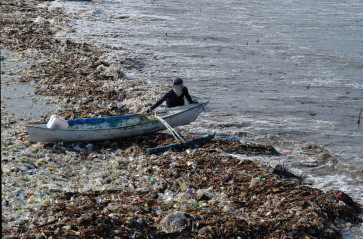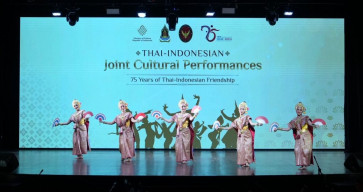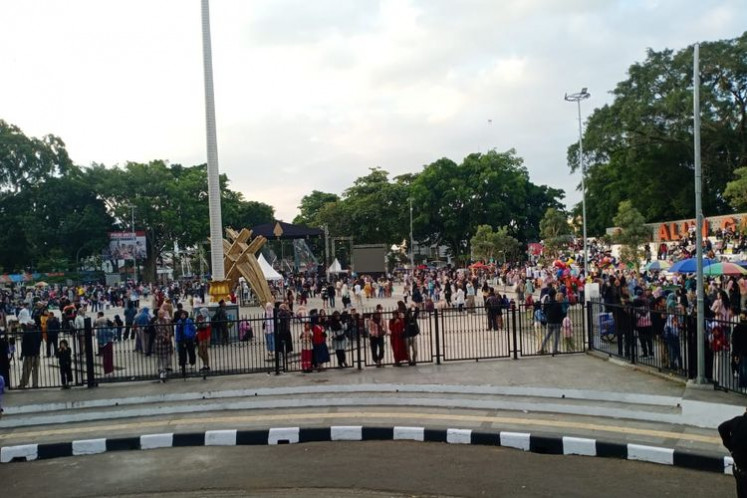Popular Reads
Top Results
Can't find what you're looking for?
View all search resultsPopular Reads
Top Results
Can't find what you're looking for?
View all search resultsCrowded neighborhood last stronghold of capital’s iconic fruit
The crowded neighborhood of Balekambang, Kramat Jati, East Jakarta, popularly known as Condet, holds the last remaining tract of land where the endemic salak condet, the capital’s iconic snake fruit, is still cultivated
Change text size
Gift Premium Articles
to Anyone
T
he crowded neighborhood of Balekambang, Kramat Jati, East Jakarta, popularly known as Condet, holds the last remaining tract of land where the endemic salak condet, the capital’s iconic snake fruit, is still cultivated.
Decades ago, salak condet and duku condet (lanzones) were cultivated on hectares of land on the banks of the Ciliwung River in Balekambang as well as Kampung Gedong, Pasar Rebo, East Jakarta, Asnawi, 55, a resident of Balekambang, said.
“Back in the 1980s, salak condet dominated Jakarta’s market. Some even say it is the oldest variety of salak on Java island,” he told The Jakarta Post recently.
A 1989 gubernatorial decree on the city’s flora and fauna declared salak condet the city’s mascot along with elang bondol (Brahminy kite), a bird that is endemic to Thousand Islands regency.
Condet was also declared a cultural and fruit sanctuary, according to a 1975 gubernatorial decree.
Asnawi recalled that salak trees used to dominate land along the river, with most of it being family owned and run, including his family.
Then in the 1990s, he said, the market was saturated by salak bali from Bali and salak pondoh from Sleman, Yogyakarta.
Local farmers in the area initially tried to hold out, but they were overwhelmed by the produce flowing in from other regions and the financial pressure eventually forced them to sell their land.
Jakarta’s massive development and migration, including to East Jakarta, also curtailed salak cultivation.
“Here, we are trying to keep our salak heritage alive,” Asnawi said.
The remaining plantation stands on 3.3 ha of land in Balekambang, which was bought by the Jakarta administration in 2007 to preserve salak condet.
Asnawi and six coworkers were hired by the Jakarta Maritime, Fisheries and Food Security Agency to take care of the land and keep the salak condet heritage alive.
Their work includes taking care of the land and its 3,500 salak trees as well as planting other trees besides salak and duku.
Asnawi said his main focus currently was to develop salak condet to bear fruit all year round as well as preparing the plantation to make it more accessible to visitors.
He added that people visited the plantation once in a while to look at salak condet, saying it had yet to be developed for proper agrotourism.
Agency head Darjamurni said the agency planned to make the plantation an agrotourism destination in the city.
In 2016, the Environment and Forestry Ministry threw its weight behind the plan when it issued a certificate that declared salak condet was endemic to Jakarta and part of its heritage.
“Besides being a fruit sanctuary [for salak condet], it will also become an educational tourist site,” Darjamurni told the Post.
He said the agency was currently preparing material on salak condet’s history, adding that the plantation was expected to operate as an agrotourism site this year.
Expansion was also in the works as the agency had prepared funds to purchase around 1,200 square meters of land to expand the plantation in Balekambang, Asnawi said.
Locals also hoped that the plantation would return salak condet to its former glory, such as 30-year-old Condet resident Lukman Hakim who said it should be expanded and improved so more people could be made aware of the city’s mascot.
“A lot of people said that salak condet is extinct, but that is not the case.
“There is still a plantation here where salak and duku are cultivated,” Lukman said, adding that his family also used to owned a salak plantation but were forced to sell it due to economic reasons.










